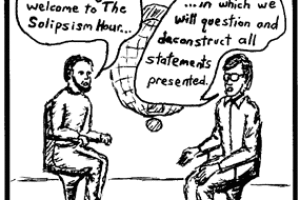The Root Issue: Failure to Listen
In my previous blog post, The Art of Listening, I discussed the important and wise lesson behind one of my favorite biblical versus—Proverbs 18:13: “He who gives an answer before he hears, it is folly and shame to him” (NASB). If you have not already done so, I highly recommend reading through that previous post as this topic is in many ways a continuation of that [all too common] issue and a result of it. I had mentioned that it is not only important to listen, but it is wise to listen to experts. I gave an example of a person who has never been fishing having a strong opinion on fishing versus an expert fisherman having an opinion on fishing. Obviously, the ignorant person’s opinion is not worth much when compared to the expert’s opinion. I don’t think it would be much of a stretch either to say that an expert’s opinion is valued more than an amateur’s. How does one become an expert? Education and experience. A lot.
The Accomplice: Anti-Intellectualism
I think we can replace the fisherman illustration with almost any other field of knowledge, profession, art, or task. Civil War Historians tend to know a lot more about the Civil War than non-Civil War Historians. Biologists tend to know a lot more about Biology than non-Biologists. Psychologists tend to know a lot more about psychology than non-Psychologists. Architects tend to know a lot more about architecture than non-Architects. Physicists tend to know more about physics than non-Physicists. Try looking at a major University’s website and peruse the various departments and subjects and try inserting them into the blanks: ________ tend to know more about ________ than non-________ .
Now, this does not mean that non-experts know nothing about topics of which they may be experienced, educated, or interested. Indeed, a person growing up working on cars might know just as much or possibly more than a lot of auto mechanics working at shops. Uncredentialed and unlicensed people can sometimes be more ‘expert’ in a field than acknowledged experts in that same field. I am always aware of exceptions and so I am usually careful not to think in absolutes. Nevertheless, we tend to observe trends, or rules, or typical things in life. So, such people are exactly that—exceptions to the rules. I might add here that there is a certain difference between knowledge and experience. On a more practical level, it is true that, for example, New Testament scholars tend to know more about the New Testament than non-New Testament scholars (and here I mean in terms of linguistic, literary, or historical nuances). However, a Christian who might not be familiar with the detailed intricacies behind a Greek passage might very well be more engaged with the practical reality of what that verse is teaching than the scholar; and so in this way the scholar might ‘know’ more about what that verse is communicating or its history, but the person practically applying the verse to his life might be more ‘experienced’ with that material. Yet, the reason why we value credentials, licensing, and certifications for various skills is because it is a formalized method for publicly acknowledging a certain level of knowledge and/or experience in fields or tasks. This is why we have colleges and universities with credentialed degrees. This is why we have Associates degrees, Bachelor degrees, Masters degrees, Doctorate degrees, etc. This is society’s way of saying, “Hey! This person has demonstrated their education, knowledge, skill, and experience in this field… they are probably qualified to speak on this subject or to work in this field.” The higher the degree a person has, the more they are considered an ‘expert’ in that field. A person with a Post-Graduate degree in a particular field should be particularly keen in her subject of ‘expertise’ and is more than likely qualified, in turn, to [accurately] educate others. After all, it is kind of insulting and frustrating for a doctor who has spent countless years, energy, brainpower, and finances, who really knows her field quite well, and who writes, lectures, and practices in her field to overhear a couple of laypersons confidently, but inaccurately, dialoging about that very subject matter.
The contributing problem of experts getting excised is an anti-intellectualism that can develop. When we are self-taught or when we have acquired thorough experience or knowledge by some other means than through a formal educational or recognized system, we can become self-reliant. This is also true of people who do go through formal education. Sometimes we just think that we have no need for our peers or for others who are experienced and learned in the same field. What is really problematic is when we think we know something, but we really do not; when we are convinced that we are accurate about something, but we really are not; when we conduct ourselves as if we are superior to actual experts, but we really are not. I am bringing up this topic because in my field of study, Biblical studies/New Testament studies (I consider myself a student and not quite an ‘expert’; this may be a personal thing, but I feel nowhere near qualified for such a label quite yet), I often encounter people who really present themselves or conduct themselves as ‘experts’ and who, ironically, attempt to discredit and disparage Biblical scholars and scholarship. They simultaneously seek to teach an audience about Biblical matters (as if they ought to be listened to as a teacher or ‘expert’) and discourage people from listening to scholars. The person [often times] with no recognized credentials proclaims the inadequacy of the credentialed. The one who admits no real formal education in the topic pontificates as an ‘expert’ while downplaying the significance of formal education in the topic. You may have encountered such people. Perhaps it was not over Biblical matters, but over medical topics, scientific topics, environmental topics, political topics, etc. They warn you not to listen to the majority of trained experts with multiple formally recognized degrees, but instead to listen to them and their DVD which you can purchase for just $9.99! You may even be able to visit their helpful website which is plagued by early 90’s html, but contains tons of truths that the experts don’t want you to know! The anti-intellectualism is strong with these ones.
The Results: Excising the Experts
Okay, that last illustration was a bit extreme and probably a reference to some conspiracy theory, but that’s my style! I like to give extreme and shocking illustrations to make a point sometimes. It is not always that obvious, but the problems of not listening to the experts or engaging intellectually on that level coupled with a pride which is cloaked by anti-intellectualism lead to the excision of experts. Experts become distrusted. Experts become removed from consideration. Their years or educational and experiential toil have come to naught. They are useless. Their degrees are meaningless. The convinced audiences are not interested in what the experts know or have to say, because they have found leaders whom they can trust, irrespective of education or ‘expertise’… because that doesn’t matter. Ironically, when these same people have an emergency and desperately need to know about their medical condition, they go to the experts—the medical doctors. It is common for people to conduct internet searches nowadays about medical conditions. I have done this before as well. However, most of the sites I look at are medical sites with articles or answers written by actual doctors. Furthermore, I would never think that I can replace the medical experts with my impressive internet searching skills. Professionals who undergo formal training and education typically have more enriching experiences during their training process and have access to more unique or superior sources than self-educated persons. A lot of this comes with the tuition paid to a college or university. The student gains access to resources and databases not otherwise as easily accessible by non-students. In the end, I think that a formal education tends to produce an expert better than a self-educated method. I would also venture to suggest that self-educators tend to end up using materials or resources which were produced by formally educated experts. However, they also can combine these with materials produced by other non-experts which will only contribute to their lack of accurate knowledge in the subject. What is disconcerting is that these self-identified ‘experts’ often go on to gain audiences and followers who are convinced of their teachers’ ‘expertise’ while maintaining a skepticism of the real experts. I suppose “even in the land of the blind, the one-eyed man is King.”1
I submit that if these same people who minimize real Biblical scholars wanted information of some other subject, they would more than likely trust the information given to them by a scholar. I doubt these people would downplay the scholarship of a Classicist explaining the life and works of Homer. So then, why is it that when it comes to other topics these people can remain so skeptical of scholarship and write them off entirely while substituting such an ideal resource with self-designated ‘experts’ and pontificators? I suggest that this is really quite foolish and that such people ought to listen to what the experts have to say and make an effort to engage with that information on that level (as much as possible). This suggestion harps back again to my previous post on The Art of Listening.
The Solution: Humility over Hubris
My advice is this: when you observe a person who is not really formally recognized as an expert in a topic giving you advice or expounding on that topic, ask yourself, “Why should I listen to this person?” In other words, “Why is this person qualified to speak on this subject and how can I trust what he/she is telling me?” If the ‘teacher’ you are listening to is characterized by hubris rather than humility in a subject which he/she is formally unqualified, you may want to reconsider assuming the role of a student under this individual and you ought to check what they are telling you against what many true experts have to say. As I stated before, this does not mean that the experts will always be correct or that you have to always listen to the experts. Sometimes the experts cannot agree amongst themselves over an issue. That’s fine… that’s expected. However, the experts probably know a lot more about the nuances of that issue than most people outside of that field of expertise. Although, it is problematic if you tend to side with non-experts (technically speaking) against formally recognized experts, especially on matters which are not hotly disputed. Moreover, it is probably self-destructive for you to write off the experts, utterly excising them, in a particular field altogether for the sake of listening instead to random ‘self-educated’ people. Maintaining humility and resisting pride is important. It will become especially awkward if you are proven to be wrong about something after a prideful disregard for the truth and nearly all known experts.
I remember a time when I had a visitor at my house and we were standing in front of my bookshelves. This individual really carried himself as if he had the Bible all figured out. The funny thing is that he had a lot of really strange ideas and interpretations. While pointing to my plethora of scholarly books, I attempted to explain to him that it is really quite challenging to think that so many (perhaps all) Biblical scholars, these expert men and women, agree on certain matters which are directly at odds with what he thinks. I even had pointed out to my visitor that one particular scholar who is a self-proclaimed agnostic, but who agrees in unanimity with practically all Biblical scholars of all personal belief backgrounds on a myriad of topics, is included in that category of academic experts who would disagree with him (my visitor) about some of his ideas. This particular scholar had written some great works on early Christianity which my visitor might find quite helpful. Therefore, it’s not always about what these experts personally believe, but about good quality research. I thought this would have been convincing enough for him to humbly acknowledge the paramount possibility at that point that he could very well just be wrong. Yet, to my dismay, he responded, “I have nothing to learn from him.”
So, I guess if all of the experts in a field say X and Dr. So and So also says X, my visitor has nothing to learn from Dr. So and So or from all of the experts in that field. Instead, my visitor will continue to present himself as an ‘expert’ in that very field and will never consider what the true experts have to say because, after all, why should he? He has ‘nothing to learn from them.’ This is the epitome of not listening (cf. Proverbs 18:13), of anti-intellectualism, and of hubris. This attitude is not at all attractive or helpful.
The solution is really quite simple: It is better to listen. It is better to listen to the experts. It is better to listen to the experts in humility.2
Endnotes
- I am not sure where this saying originated, but I love it and I say it often!
- I will likely post more on this and related topics because this is an issue which has bothered me for a long time and which I see rampant in Christendom and especially in fringe groups and religions which have splintered from Christendom. I believe this behavior is more prominent in religious topics and in Biblical matters because people really do want to know spiritual truth and to ensure that their thinking and conduct are in line with what they perceive to be reality and truth. It is thus much easier for people to write off scholars of religious or Biblical studies because such people do not want to confront that fact that these experts actually disagree with them. I believe a lot of this has to do with fear; people are afraid of being wrong and confessing that they were wrong and changing their beliefs and lifestyles to reconcile them with what is probably actually true.





1 Comment
Leave your reply.